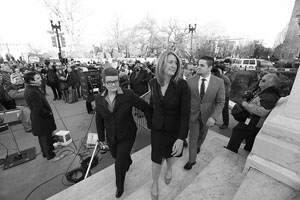Kris Perry doesn’t think about the way historians will tell her story.
Instead, the 1986 Merrill College graduate with degrees in sociology and psychology thinks how life will be different for children nationwide because of what she did.
Perry was the named plaintiff in a lawsuit that challenged, and eventually overturned, Proposition 8, a 2008 California constitutional amendment banning same-sex marriages. The decision opened the door for same-sex unions in the state.
Her effort also was part of the groundswell that led to a landmark decision by the United States Supreme Court in June, legalizing same-sex marriage nationwide. Her case, Hollingsworth vs. Perry, provided a foundation for other district court cases and for the marriage-rights movement in general. In addition, the public education she engaged in was part of the change in public opinion that led to more acceptance of gay marriage nationwide.
“Sandy (Steir, Perry’s wife and co-plaintiff) and I are elated and relieved that we now live in a country where everyone can be married,” Perry said. “We’ve both experienced not only the joy of marriage these past two years but also the sense of permanence and protection marriage provides.
“We are thrilled for our family and for all the families across the country who can celebrate their love and connection today.”
Born in Bakersfield, Calif., Perry always felt like she was different. She just wasn’t sure why until she came to UC Santa Cruz.
“The middle of my freshman year, I started to figure it out,” Perry said. “I felt very supported as a person, and I found my voice, and how to be committed to a cause, and to put myself in situations where I made a difference. All the values that were emblematic of UC Santa Cruz were perfect for me at the time.”
In 2004, she married her longtime partner, Stier, at a ceremony at San Francisco City Hall. “A couple of months later, we got a letter from the City of San Francisco saying they had to rescind the marriage,” Perry remembered. “They’d attached the $35 check we’d paid for the marriage license. That really was a punch to the gut.”
Four years later, Prop. 8 passed and Perry was asked if she and Stier would be plaintiffs in a federal lawsuit challenging the same-sex marriage ban. Perry was working for celebrity activist Rob Reiner on early childhood education at the time.
It was not a hard decision, said Perry, although she knew it would put her family, including the couple’s four children, under scrutiny. What was difficult, she said, was the pressure of having to represent an entire group of people with her story “in an authentic and useful way.”
On June 26, 2013, the U.S. Supreme Court declined to overturn a lower-court decision that declared the amendment unconstitutional, and Perry got a call from President Barack Obama telling her he was proud of what she had done.
Two days later, after the lower court unexpectedly lifted its stay of the ruling, Perry and Stier were married in a rushed ceremony at San Francisco City Hall.
“I was elated, overwhelmed, excited, happy, and a little bit in shock,” said Perry of her marriage. “I probably felt as happy as I have ever felt except for the day the boys (her twin sons) were born.” (The couple’s two other children are Stier’s from a previous marriage.)
“The part for me that thinks about history is how generations won’t be limited the way I was,” said Perry from her Washington, D.C.. office where she advocates for early childhood education. “I felt shame about who I was partially because of the laws (regarding same-sex marriage) that were in place. Those laws will be ancient history before kids today are old enough to fall in love.”
Today, Perry is executive director of the First Five Years Fund, an advocacy group promoting early childhood education, and is happily settled with Stier in the nation’s capital.
But it’s not hard for Perry to summon the memory of the early days when she felt shame, when she was bombarded by the judgments of others because of who she was.
“I expended a huge amount of emotional energy just to feel OK or to be OK when other people were using their energy for totally different things like their careers and relationships,” Perry said. “I spent my life in a defensive posture.”



